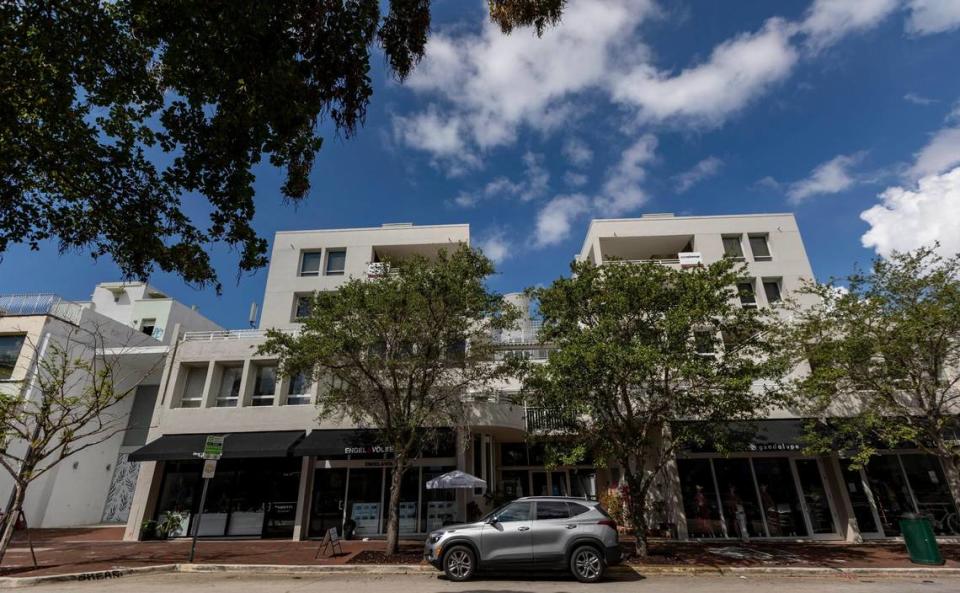Mayor Francis Suarez worked to draft new law with developer who later paid him $170K
- Oops!Something went wrong.Please try again later.
Miami Mayor Francis Suarez and his city staff joined forces with developer Rishi Kapoor to draft a new city law that the developer saw as vital for his $70 million Coconut Grove real estate project, according to emails from the mayor’s office obtained by the Miami Herald.
Kapoor later paid Suarez at least $170,000 for consulting for the developer in regular $10,000 increments dating back to at least 2021.
The mayor’s financial deal with the developer is currently under federal investigation following a Herald report detailing how an aide to the mayor helped Kapoor sidestep a permitting issue that threatened the viability of the project in 2022.
The newly obtained emails reveal how the relationship between Kapoor and the mayor’s office began years before the aide made a call to the city’s zoning director, who ultimately overrode a code requirement that the building be set back five feet from the property line, paving the way for permitting.
The communications from the mayor’s office, which date back to 2019, show previously unknown levels of collaboration between the mayor and Kapoor’s company, Location Ventures, which paid Suarez the $10,000 per month through a subsidiary associated with the Grove project. Although the ordinance did not pass, the joint effort to change the code provides another example of the mayor’s office working for Kapoor’s benefit.
Suarez, who is a candidate for the Republican nomination for president, previously told reporters that he had never had any meetings with Kapoor and city staff to discuss the Grove project. But city calendar invites indicate the two met at least half a dozen times between January 2020 and August 2021 — sometimes over Zoom but also in person at the Cocoplum Yacht Club, plus one meeting with “home” as the listed location.
It’s unclear from internal company records reviewed by the Herald when Kapoor hired Suarez, but the records show payments started no later than September 2021 — one month after the final calendar invite for a meeting with Kapoor that was sent to Suarez’s city email.
READ MORE: Mayor for Hire: Francis Suarez’s wealth boomed while he promoted Miami as tech capital
The city code, written when housing was cheaper, did not address the kind of modern co-living and micro-units Kapoor and other developers were pitching in 2020 as a creative solution to the city’s housing affordability crisis. Emails show Kapoor’s team went through the mayor’s office to help shape the proposed update to the code to benefit their vision for bringing the dorm-style housing to Commodore Plaza.
Often, the calendar invites show, the two men were joined by city administrators to discuss the code changes that would facilitate Kapoor’s project.
Despite their efforts, city records show the ordinance was repeatedly deferred. Opting to move forward without the change to zoning codes, Kapoor’s team applied for a permit for their Grove co-living project in December 2021.
Internal Location Ventures records indicate Kapoor asked Suarez to meet again in July 2022 regarding the setback problems stalling the permit application process. The city emails do not reference that meeting.
Neither the mayor’s office nor his campaign responded to the Herald’s request for comment.
Kapoor’s attorney, Brian Goodkind, acknowledged the meetings between Kapoor and Suarez regarding the co-living ordinance, but said Suarez was not working for URBIN — the company developing the Coconut Grove property — in 2020.
“Ultimately, the ordinance was not enacted and the Commodore project was modified to avoid the need for the ordinance,” Goodkind said. “The important part is that the co-living ordinance concept was abandoned long before there was any consulting relationship between URBIN and Mayor Suarez.”
Suarez, who is paid $130,000 for his part-time mayoral duties, previously told the Herald that he was not paid to help Kapoor with zoning or permitting issues but rather to introduce the developer to potential investors.

Barbara Petersen of the Florida Center for Government Accountability, a non-profit transparency watchdog, expressed concern over the closed-door nature of the meetings between the mayor and a developer who hired him.
“We have no clue what they’re discussing, what he’s pushing, what’s being offered,” Petersen said. “It sort of flies in the face of the whole notion of accountability and transparency.”
Emails show Kapoor’s team first reached out to the mayor’s office in late 2019, securing a crucial meeting with Suarez and his chief of staff to discuss plans for the Commodore Plaza and “some code amendments which would be necessary to realize the project.”
After at least two meetings between the mayor, city staff and the developer, Kapoor’s team emailed Suarez a “markup” of the city’s draft co-living ordinance. The comments, written on Aug. 25, 2020, by the company’s general counsel — Romy Kapoor — indicated several sections “should be” rewritten and suggested some of the city’s proposed requirements for the type of project the company planned were “excessive,” particularly regarding the minimum number of parking spaces and bike racks.
Read the marked-up draft legislation sent to the mayor’s office
In the same email, Kapoor’s team asked the mayor’s office to set up a meeting with the Planning Department to “finalize this proposed legislation so that URBIN can proceed with its promising residential projects on Commodore Plaza.”
Suarez’s then-chief of staff, Jeremy Schwarz, responded by saying the mayor’s team wanted to move forward with the meeting as soon as possible.
“Thank you to all very much,” Kapoor wrote back to Suarez and his staff.
Bob Jarvis, a Nova Southeastern University law professor specializing in ethics, said that if Kapoor paid Suarez specifically for special privileges and access, the situation would prompt the question “is City Hall for Sale?”
“You’re not allowed to grease the wheels,” Jarvis said.
Co-Living Ordinance
In late 2020, then-Commissioner Ken Russell sponsored the ordinance that would allow — and regulate — co-living spaces developed in Miami. Emails show that Russell had also been in contact with Kapoor’s team over the previous 12 months and received the same marked-up copy of the ordinance as the mayor.
Russell said Suarez never told him about his consulting agreement with the developer lobbying for the effort. He said he didn’t remember discussing the ordinance with the mayor, although emails show Russell was invited to at least one meeting with Suarez and Kapoor on the topic.
Russell said he sponsored the proposed change to the code because he saw co-living as one potential solution to the city’s affordability crisis.
“I think co-living is a really good concept when done correctly,” Russell told the Herald.

As a commissioner, Russell said he worked with city staff and various developers — including Rishi Kapoor — to draft an ordinance that would ease the permitting process for co-living projects while also addressing concerns about traffic headaches and parking pressures that detractors worried were the likely result of crowding so many new people into a condo consisting of individually rented rooms.
Russell said he dropped the effort after it was clear there would be no consensus on a path forward.
“None of the developers could agree among each other and the planning department couldn’t agree. And I wasn’t going to push forward until we agreed,” Russell said.
City records show the ordinance was deferred repeatedly and finally withdrawn in January 2023. But a similar proposal was then introduced and ultimately adopted by the city commission on June 8, 2023. It was approved with the same minimum parking requirements that caused Kapoor’s team to balk years before.
Kapoor’s Coconut Grove project broke ground in January, with Suarez standing beside the developer, both men in hard hats.

